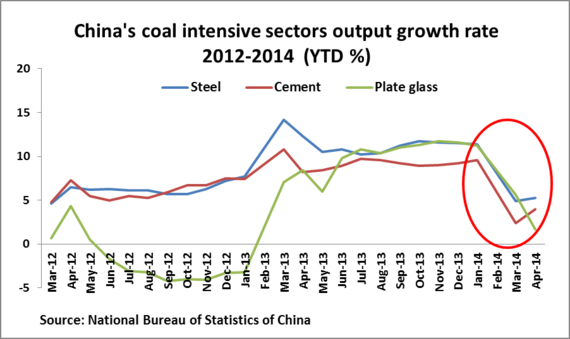Page added on May 21, 2014
China’s Thirst for Coal is Drying Up
As the ‘airpocalypse‘ news out of China continues to grow, what we predicted more than a year ago is now increasingly obvious – China’s seemingly endless coal demand is a myth, and the Chinese coal boom is over.
What we often hear about a never-ending demand for coal in China has turned out to be just a desperate attempt by a flailing industry seeking to convince investors and politicians that they have a future in a cleaner, greener 21st century. But as frustration with deadly coal pollution grows along with China’s booming clean energy industry, this looks increasingly doubtful.
Since news of the airpocalypse first broke, the Chinese public has become increasingly adamant that dangerous air pollution from coal-burning power plants be curbed. In response, China’s State Council announced a detailed plan — The Airborne Pollution Prevention and Control Action Plan — that aimed to cut pollution from coal-fired power plants in September of last year. This was the historic first step towards curbing China’s air pollution crisis – but its only the beginning.
Responding to the growing outrage over air pollution just two months ago, the Chinese Premier declared a “war on pollution.” His announcement put clean air at the top of the policy making agenda, including new efforts to reduce toxic emissions from China’s largest source of air pollution – coal-burning plants.
In doing so, the government will be directly improving the air quality in two of China’s major cities — Hebei and Shanxi. Hebei produces 12 percent of the world’s crude steel and is inextricably blanketed in smog as a result. Similarly, Shanxi produces 12 percent of the world’s coal. Both regions surrounding the city will benefit from less pollution from coal-fired power plants, meaning cleaner, healthier lives for their citizens.
The dangers of burning coal have become increasingly clear to the Chinese public – and the country has already seen an astonishing reduction in the growth of coal consumption and total coal demand. Several high profile banks have predicted China will hit peak coal demand before 2020, and a decline in coal burning and coal pollution would be just around the corner. At the same time, China’s clean energy industry is booming, with solar production skyrocketing.
All that reinforces our main point – China’s coal boom is over, with demand falling faster than expected. And that means we finally can see the light at the end of a long, dark tunnel. The latest data from China’s National Coal Association suggests that while China burned 940 million tonnes of coal in the first quarter of 2014, that’s only a 0.9 percent increase from last year, down from a 9.8 percent increase in 2011.
As this trend continues, China’s peak coal consumption is looming ever closer, and the decline of coal consumption is just around the corner.
7 Comments on "China’s Thirst for Coal is Drying Up"



rockman on Wed, 21st May 2014 7:51 am
Talk about a silly effort to put a positive spin on a bad situation. Hopefully everyone realizes they are not talking about a decrease in Chinese coal consumption but a significant slowing of the rate of increase. China consumes 2.7X as much coal today as it did just 10 years ago. And 70% of Chinese energy still comes from coal. Assuming China has no growth in coal consumption in the next 10 years they will still burn 5X as much coal as the US.
Chinese coal consumption is booming. What isn’t happening is the surge in the rate of increase. By my definition the boom will be over when their consumption level returns to where it was just 10 years ago when the surge began. But understand even before the surge began Chinese coal consumption has had a steady increase since 1965. IMHO it would be wise to not hold one’s breath waiting for consumption to return to levels of just 10 years ago. LOL.
J-Gav on Wed, 21st May 2014 10:17 am
Yeah, a little premature to be talking about China’s demand for coal “drying up!”
rockman on Wed, 21st May 2014 10:50 am
J-Gav: I’m not much on conspiracy theories and such but IMHO that headline is pure propaganda specifically chosen to mislead folks who only read headlines and don’t really dig into the meat of the story. The text of the story, though emphasizing just the facts they choose, doesn’t make false statements per se.
Plantagenet on Wed, 21st May 2014 11:52 am
China is the world’s leading CO2 producer and principal cause of Greenhouse warming. The best way to get them to reduce coal use would be to tie them into a global UN climate change treaty. Of course Obama promised to sign a new post-Kyoto UN treaty when he ran for office in 2008, but in 2010 he went to Copenhagen and deep-sixed the UN Climate Treaty that was scheduled to be signed there, thereby derailing the UN treaty process completely.
GregT on Wed, 21st May 2014 2:23 pm
Plant,
Finally, an Obama comment with some ‘merit’!
foxv on Thu, 22nd May 2014 10:29 am
Funny, the article talks about coal consumption but puts up a chart of China’s “coal intensive” industries.
Those industries are also part of the “Primary” industries and are bellwethers of the economy as a whole.
I see economic crash in that chart, not pollution controls
Richard Nehring on Fri, 23rd May 2014 3:11 pm
The underlying question here is whether the Chinese are making a virtue out of a necessity. Good statistics on Chinese coal resources and reserves are hard to come by, but there are some indications that the cost of coal production in China is increasing, suggesting that the Chinese coal production industry is being forced to go after increasing marginal, that is, most costly resources. If this trend accelerates, it will mark the end of cheap coal in China and thus the ability to increase energy production easily. Without more cheap energy production, Chinese economic growth drops sharply and perhaps even comes to an end, a trend that has immense political consequences.